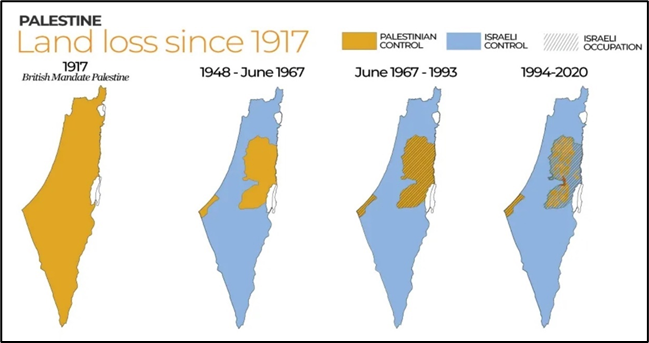Why in news?
- Recently, the United Nations General Assembly (UNGA) passed a resolution that asked the International Court of Justice (ICJ) to render its opinion on the legal consequences of Israel’s prolonged occupation of Palestinian land.
- India was one of the 53 countries that abstained from the vote while U.S. and Israel voted against the resolution.
What’s in today’s article?
- International Court of Justice (ICJ)
- News Summary
International Court of Justice (ICJ)
- The ICJ is the principal judicial organ of the United Nations (UN).
- It was established in June 1945 by the Charter of the United Nations and began work in April 1946.
- The seat of the Court is at the Peace Palace in The Hague (Netherlands).
- It is the only one of the six principal organs of the UN that is not located in New York City.
- English and French are the ICJ’s official languages.
Role
- The role of ICJ is:
- to settle, in accordance with international law, legal disputes submitted to it by States and
- to give advisory opinions on legal questions referred to it by authorized United Nations organs and specialized agencies.
Members and Jurisdiction of ICJ
- All members of the UN are automatically parties to the ICJ statute. However, this does not automatically give the ICJ jurisdiction over disputes involving them.
- The ICJ gets jurisdiction only if both parties consent to it.
- The judgment of the ICJ is final and technically binding on the parties to a case.
- There is no provision of appeal. It can at the most, be subject to interpretation or, upon the discovery of a new fact, revision.
- The ICJ has no way to ensure compliance of its orders, and its authority is derived from the willingness of countries to abide by them.
News Summary: Israel - Palestine Conflict
Israel - Palestine Conflict
- The Israeli-Palestinian conflict dates back to the end of the nineteenth century.
- In 1947, the United Nations adopted Resolution 181, known as the Partition Plan, which sought to divide the British Mandate of Palestine into Arab and Jewish states.
- Palestine was a part of Ottoman empire, later became part of British empire.
- On May 14, 1948, the State of Israel was created, sparking the first Arab-Israeli War.
- The war ended in 1949 with Israel’s victory, but many Palestinians were displaced and the territory was divided into 3 parts: the State of Israel, the West Bank (of the Jordan River), and the Gaza Strip.
- In another war in 1967 (also known as six day war), Israel occupied East Jerusalem and the West Bank, as well as most of the Syrian Golan Heights, Gaza and the Egyptian Sinai peninsula.
How has Israel altered its occupation of Palestinian land over the years?
- When the war was over, Israel had captured more territories than what the UN plan had proposed and some 7,00,000 Palestinians were displaced.
- Israel still occupies the West Bank, and although it pulled out of Gaza the UN still regards that piece of land as occupied territory.
- Israel claims the whole of Jerusalem as its capital, while the Palestinians claim East Jerusalem as the capital of a future Palestinian state.
- In the past 50 years Israel has built settlements in these areas, where more than 600,000 Jews now live.
- Settlements are held to be illegal under international law - that is the position of the UN Security Council - although Israel rejects this.

What does the resolution seek to do?
- The resolution passed by the UNGA on December 30 asked the ICJ to provide its advisory opinion on the legal consequences of:
- Israel’s occupation, settlement and annexation;
- Israel’s measures aimed at altering the demographic composition, character and status of the Holy City of Jerusalem
What will be the consequence of this referral to the ICJ?
- There are two possibilities when a referral is made to the ICJ:
- it can either lead to a settlement with a party withdrawing its case or
- it can lead to a trial followed by a verdict.
- While its rulings are binding, the ICJ has no power to enforce them.
- The last time the ICJ dealt with the issue of Israeli occupation was in 2004 when it ruled that the separation or security wall built by Israel in the West Bank was illegal but Israel rejected the verdict, terming it politically motivated.










